-
12-04-2023
Simulation training of caregivers at hospital discharge of patients with chronic diseases: an integrative review
Revista Brasileira de Enfermagem. 2023;76(6):e20230043
Abstract
Simulation training of caregivers at hospital discharge of patients with chronic diseases: an integrative review
Revista Brasileira de Enfermagem. 2023;76(6):e20230043
DOI 10.1590/0034-7167-2023-0043
Views0See moreABSTRACT
Objective:
to identify evidence about the use and effects of clinical simulation for preparing caregivers for discharging patients with chronic conditions.
Methods:
an integrative peer review in the Scopus, PubMed, Web of Science, Cumulative Index to Nursing and Allied Health Literature, ScienceDirect and Virtual Health Library databases, from July to September 2022.
Results:
3,218 studies were identified, with a final sample consisting of four national and two international articles. Using simulation as an educational technology contributed to caregiver preparation in home care. In most studies, using clinical simulation included using other strategies to complement training: expository dialogued class, conversation circle and audiovisual resources.
Final considerations:
simulation proved to be efficient for training caregivers, with the active participation of family members and nurses in health education actions.
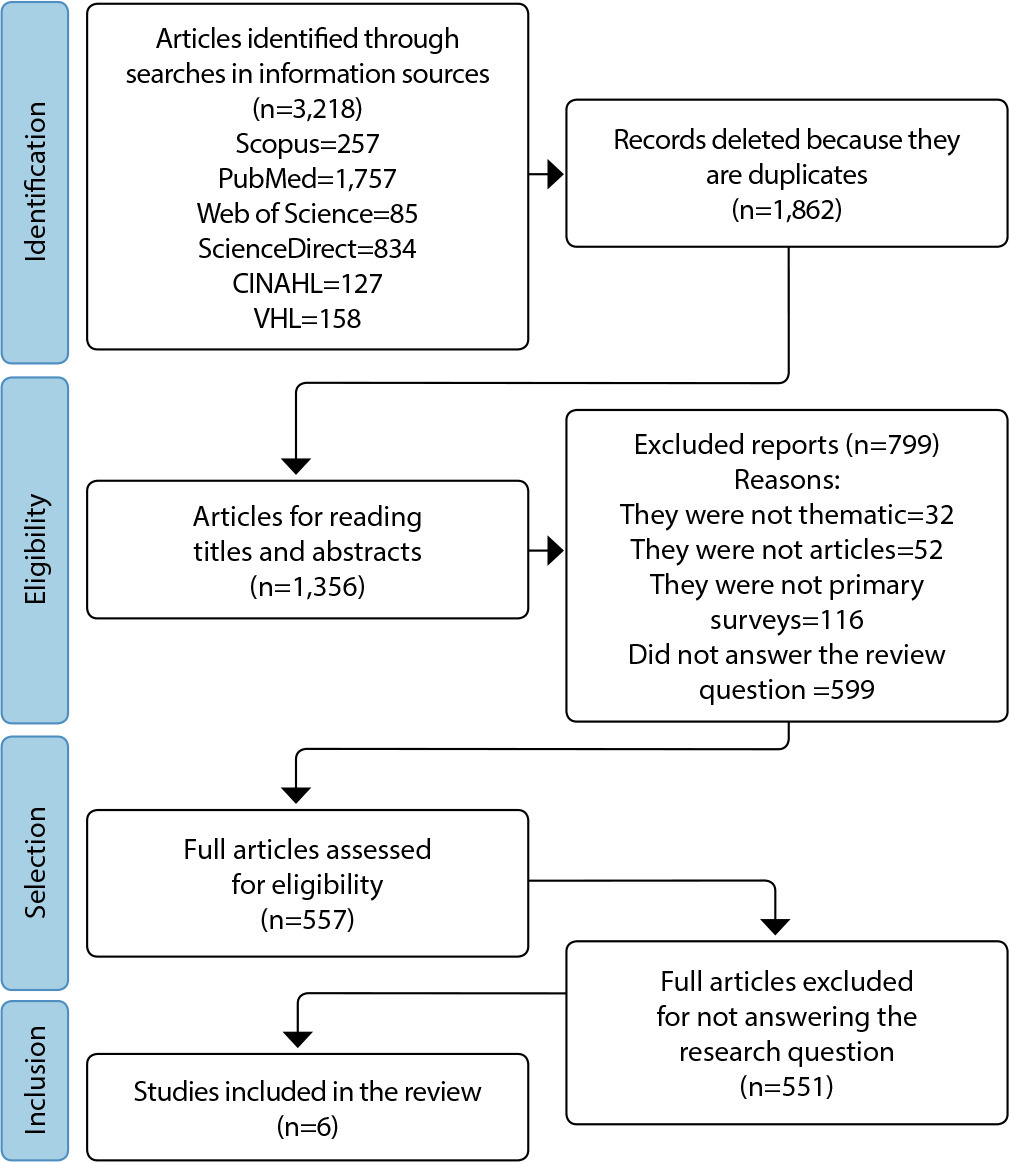
-
ORIGINAL ARTICLE12-04-2023
A longitudinal study of burden among spouse and non-spouse caregivers of older adults with stroke-induced-dependency
Revista Brasileira de Enfermagem. 2023;76(6):e20230052
Abstract
ORIGINAL ARTICLEA longitudinal study of burden among spouse and non-spouse caregivers of older adults with stroke-induced-dependency
Revista Brasileira de Enfermagem. 2023;76(6):e20230052
DOI 10.1590/0034-7167-2023-0052
Views0See moreABSTRACT
Objective:
to assess the burden of spouse and non-spouse caregivers of older adults with stroke-induced-dependency after discharge from a university hospital’s Specialized Care Stroke Unit in southern Brazil.
Methods:
a longitudinal survey. The sample consisted of 48 consenting caregivers, among which 20 were spouse caregivers. Data were collected between May 2016 and July 2018. One week after discharge, caregivers completed a sociodemographic profile, the Functional Independence Measure, and the Caregiver Burden Scale. Burden was also measured two months after discharge. Data were analyzed using Multivariate Analyses of Variance.
Results:
regarding time 1, non-spouse caregivers experienced greater burden with respect to social isolation (p = .01). Along with a persistently greater sense of isolation (p=.04), non-spouse caregivers felt far greater general strain (p =.01).
Conclusion:
statistically significant differences in burden over time highlight the importance of assessing caregiver burden after discharge and the need for a formal support program.
-
ERRATUM12-04-2023
ERRATUM
Revista Brasileira de Enfermagem. 2023;76(6):e2023n6e06
Abstract
ERRATUMERRATUM
Revista Brasileira de Enfermagem. 2023;76(6):e2023n6e06
DOI 10.1590/0034-7167.20237606e06
Views0In the article “Undergraduate nursing students’ knowledge and experience in infusion therapy and peripheral vascular acces”, with DOI number: , published in Revista Brasileira de Enfermagem, 2023;76(3): e20220219, authored:Where it read:[…]See more -
12-04-2023
Sobrecarga entre cuidadores cônjuges e não cônjuges de idosos dependentes por AVC: estudo longitudinal
Revista Brasileira de Enfermagem. 2023;76(6):e20230052
Abstract
Sobrecarga entre cuidadores cônjuges e não cônjuges de idosos dependentes por AVC: estudo longitudinal
Revista Brasileira de Enfermagem. 2023;76(6):e20230052
DOI 10.1590/0034-7167-2023-0052
Views0See moreRESUMEN
Objetivo:
evaluar la carga de los cuidadores conyugales y no conyugales de ancianos con dependencia inducida por ictus después del alta de la Unidad de Atención Especializada en Ictus de un hospital del sur de Brasil.
Métodos:
una encuesta longitudinal, con 48 cuidadores (20 cónyuges). Datos fueron recolectados entre mayo/2016 y julio/2018. Una semana después del alta, se aplicó la Medida de Independencia Funcional a los ancianos y la Caregiver Burden Scale a los cuidadores. Los datos se analizaron mediante análisis multivariado de varianza.
Resultados:
en tiempo 1, los cónyuges experimentaron mayor carga en relación al aislamiento social (p=0,01). Los cónyuges sintieron una tensión general y sensación de aislamiento mucho mayor (p=0,01; p=0,04).
Conclusión:
las diferencias estadísticamente significativas en la carga a lo largo del tiempo resaltan la importancia de evaluar la carga del cuidador después del alta y la necesidad de un programa de apoyo formal.
-
12-04-2023
Enfermagem e os Objetivos de Desenvolvimento Sustentável (ODS): Um Compromisso Essencial
Revista Brasileira de Enfermagem. 2023;76(6):e760601
Abstract
Enfermagem e os Objetivos de Desenvolvimento Sustentável (ODS): Um Compromisso Essencial
Revista Brasileira de Enfermagem. 2023;76(6):e760601
DOI 10.1590/0034-7167.2023760601pt
Views0Os Objetivos de Desenvolvimento Sustentável (ODS) são uma iniciativa global lançada pela Organização das Nações Unidas (ONU) em setembro de 2015 como parte da Agenda 2030 para o Desenvolvimento Sustentável, cujos objetivos sumarizam um apelo universal à ação para acabar com a pobreza, proteger o meio ambiente e garantir que todas as pessoas tenham acesso […]See more -
12-04-2023
Efeitos da auriculoterapia na ansiedade e biomarcadores na Atenção Primária à Saúde: um ensaio clínico
Revista Brasileira de Enfermagem. 2023;76(6):e20220728
Abstract
Efeitos da auriculoterapia na ansiedade e biomarcadores na Atenção Primária à Saúde: um ensaio clínico
Revista Brasileira de Enfermagem. 2023;76(6):e20220728
DOI 10.1590/0034-7167-2022-0728pt
Views0See moreRESUMEN
Objetivo:
evaluar los efectos de la auriculoterapia sobre la ansiedad y los niveles séricos de factor neurotrófico derivado de cerebro (BDNF), enolasa-específica de neurona (NSE) y proteína fijadora de calcio S100B (S100B) en adultos atendidos en Atención Primaria de Salud.
Métodos:
ensayo clínico piloto preexperimental. Se obtuvo información de 19 pacientes mediante el Inventario de Ansiedad Estado-Rasgo (STAI) y análisis de niveles séricos de BDNF, NSE y S100B.
Resultados:
la puntuación de ansiedad preintervención en el IDATE-Rasgo fue de 52,11±6,691 (CV 12,84%) y la valoración tras la auriculoterapia fue significativamente menor (43,72±8,141; CV 18,62%; P=0,0007). Los niveles de S100B se redujeron significativamente después de la auriculoterapia (de 64,03±72,18 a 54,03±68,53 pg/mL; CV 126,8%; P=0,0023).
Conclusión:
la auriculoterapia redujo efectivamente los niveles de ansiedad. Demostró ser seguro y fácil de aplicar, lo que permitió a las enfermeras realizar esta técnica de forma autónoma. También se evidenció una reducción de S100B, lo que demuestra una posible prevención del daño neuronal.
-
12-04-2023
Nursing and the Sustainable Development Goals (SDGs): An Essential Commitment
Revista Brasileira de Enfermagem. 2023;76(6):e760601
Abstract
Nursing and the Sustainable Development Goals (SDGs): An Essential Commitment
Revista Brasileira de Enfermagem. 2023;76(6):e760601
DOI 10.1590/0034-7167.2023760601
Views0The Sustainable Development Goals (SDGs) are a global initiative launched by the United Nations (UN) in September 2015 as part of the 2030 Agenda for Sustainable Development, whose objectives summarize a universal call to action to end poverty, protect the environment and ensure that all people have access to opportunities and well-being, all in an […]See more -
ORIGINAL ARTICLE12-04-2023
Effect of cardiovascular biofeedback on nursing staff stress: a randomized controlled clinical trial
Revista Brasileira de Enfermagem. 2023;76(6):e20230069
Abstract
ORIGINAL ARTICLEEffect of cardiovascular biofeedback on nursing staff stress: a randomized controlled clinical trial
Revista Brasileira de Enfermagem. 2023;76(6):e20230069
DOI 10.1590/0034-7167-2023-0069
Views0See moreABSTRACT
Objective:
to assess the effect of cardiovascular biofeedback on nursing staff stress when compared to an activity without self-monitoring.
Method:
a randomized controlled clinical trial, carried out with nursing professionals from a university hospital. The intervention group (n=58) performed cardiovascular biofeedback, and the control (n=57) performed an online puzzle without self-monitoring, totaling nine meetings over three weeks. The outcome was assessed using the Stress Symptoms and Work-Related Stress scales, and the biological marker heart rate variability. The generalized estimating equations method was used.
Results:
the intervention had no effect on self-reported instruments (p>0.050). However, there was an effect of time (p<0.050) on all heart rate variability indicators, demonstrating changes over the sessions.
Conclusion:
cardiovascular biofeedback showed promising results in the biological marker, suggesting that it can be used in nursing staff as a complementary therapy by promoting better autonomic nervous system regulation.

-
ORIGINAL ARTICLE06-14-2021
Continuity of neuro-psychomotor stimulation of children with congenital Zika syndrome
Revista Brasileira de Enfermagem. 2021;74(6):e20200694
Abstract
ORIGINAL ARTICLEContinuity of neuro-psychomotor stimulation of children with congenital Zika syndrome
Revista Brasileira de Enfermagem. 2021;74(6):e20200694
DOI 10.1590/0034-7167-2020-0694
Views0See moreABSTRACT
Objective:
Understand the continuity of stimulation of neuro-psychomotor development in children with congenital Zika syndrome.
Method:
Descriptive-exploratory study with theoretical support in symbolic interactionism. Between August and November 2019, 12 health professionals were interviewed in depth; and to the focus group, seven caregivers of children with the syndrome. The analysis was thematic inductive.
Results:
The continuation of neuro-psychomotor stimulation of children with Zika syndrome goes through: organizational difficulties (lack of doctors, professional unpreparedness, dissatisfaction and search for other services); socioenvironmental aspects (low maternal education, low socioeconomic level, difficulty in moving and lack of support); and conditions inherent to children (hospitalizations for respiratory crises, seizures, hypoactivity and social stigma).
Final considerations:
A strengthened support network with qualified human resources is necessary in order to provide comprehensive care and avoid the discontinuity of neuro-psychomotor stimulation of children with congenital Zika syndrome.
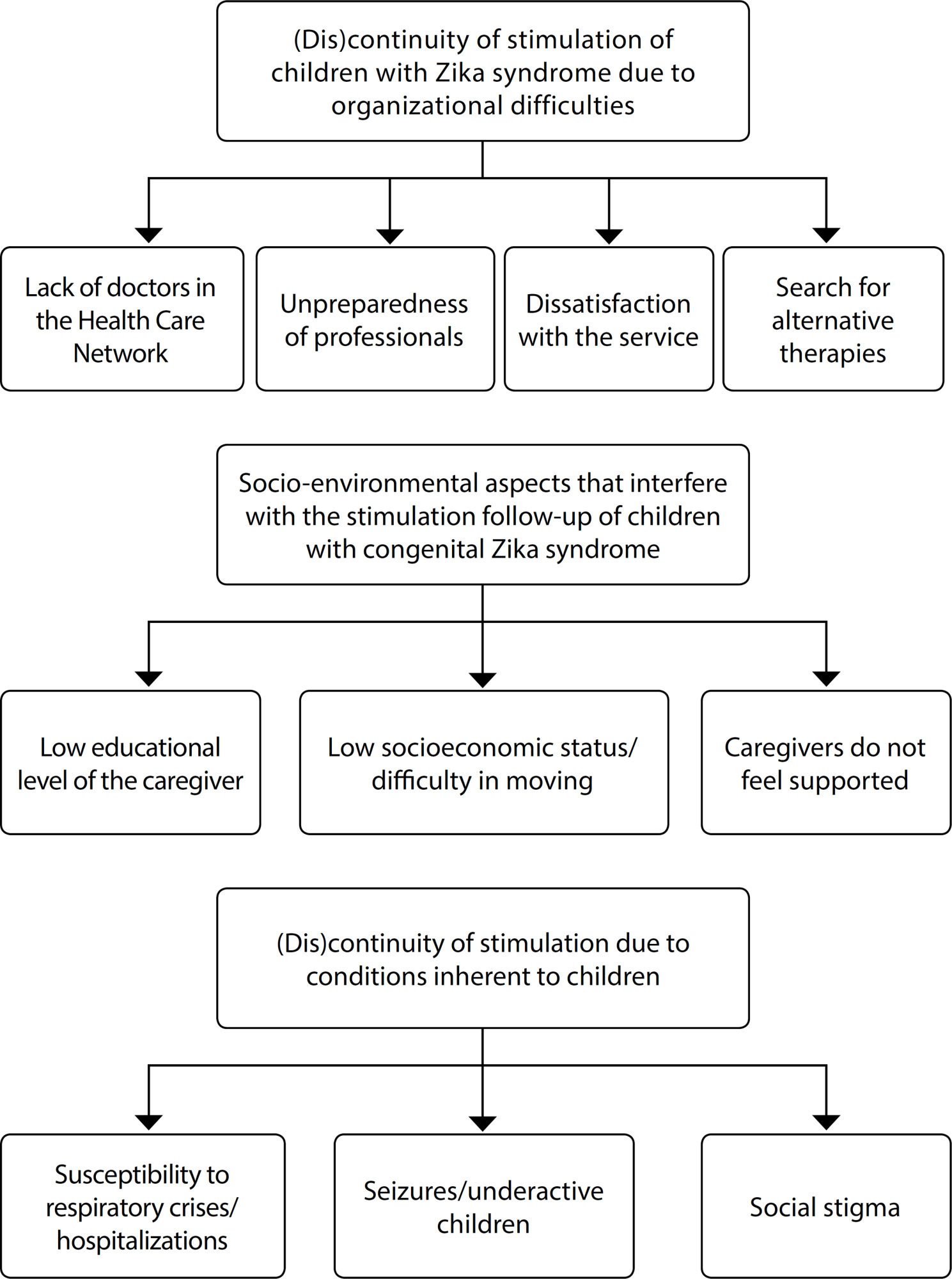
-
ORIGINAL ARTICLE08-20-2021
Risk of suicide among nursing students
Revista Brasileira de Enfermagem. 2021;74(6):e20200867
Abstract
ORIGINAL ARTICLERisk of suicide among nursing students
Revista Brasileira de Enfermagem. 2021;74(6):e20200867
DOI 10.1590/0034-7167-2020-0867
Views0See moreABSTRACT
Objectives:
to identify the risk and degree of risk of suicide in nursing students of a public institution in the countryside of Pernambuco, Brazil.
Methods:
this was a cross-sectional, quantitative research conducted with 150 students. For data collection, a sociodemographic questionnaire and the instrument, M.I.N.I. – Brazilian version 5.0.0 – Module C – Risk of suicide were used. Statistical analyses were performed with IBM(® )SPSS(®), version 23.
Results:
53.3% of nursing students had a risk of suicide, of which 20.7% had a high risk. Moreover, 22.67% reported previous suicide attempt. It is noteworthy that students without a partner have a higher risk of suicide (56.8%) than those with a partner (29.4%).
Conclusions:
it is perceived the need to develop programs that identify students at risk of suicide in higher education institutions, in order to raise awareness of the problem and implement policies to promote mental health in the academia.
-
REVIEW08-20-2021
Root Cause Analysis, Failures and Effects in pediatric total quality management: a scoping review
Revista Brasileira de Enfermagem. 2021;74(6):e20200954
Abstract
REVIEWRoot Cause Analysis, Failures and Effects in pediatric total quality management: a scoping review
Revista Brasileira de Enfermagem. 2021;74(6):e20200954
DOI 10.1590/0034-7167-2020-0954
Views0See moreABSTRACT
Objectives:
to analyze the applicability of Root Cause Analysis and Failure Mode and Effect Analysis tools, aiming to improve care in pediatric units.
Methods:
this is a scoping review carried out according to the Joanna Briggs Institute guidelines, following the Preferred Reporting Items for Systematic Reviews and Meta-Analyzes extension for Scoping Reviews. Search took place in May 2018 on 15 data sources.
Results:
search totaled 8,254 studies. After using the relevant inclusion and exclusion criteria, 15 articles were included in the review. Of these, nine were published between 2013 and 2018, 12 used Failure Mode and Effect Analysis and 11 carried out interventions to improve the quality of the processes addressed, showing good post-intervention results.
Final Considerations:
the application of the tools indicated significant changes and improvements in the services that implemented them, proving to be satisfactory for detecting opportunities for improvement, employing specific methodologies for harm reduction in pediatrics.
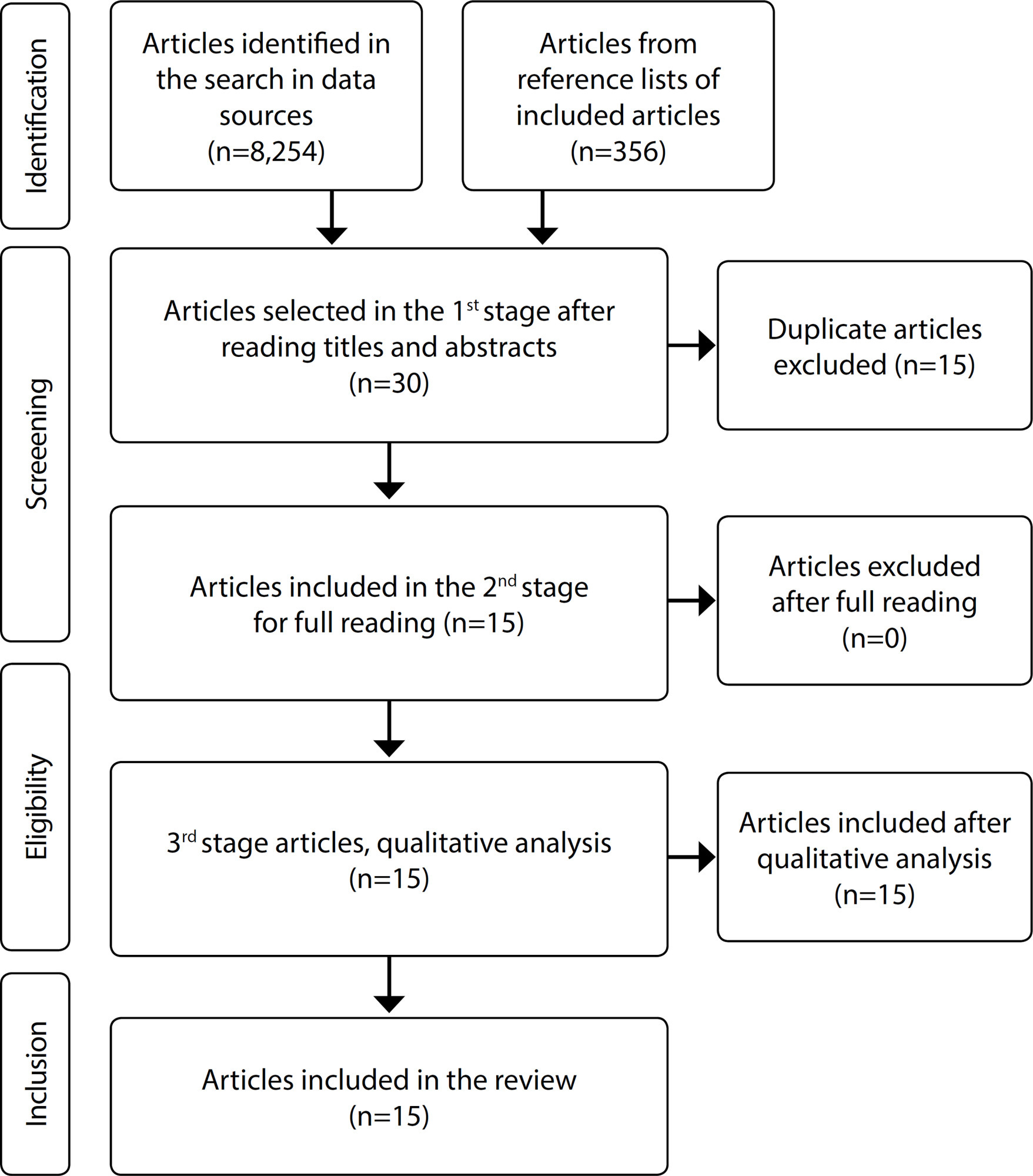
-
ORIGINAL ARTICLE07-26-2021
Representations about sexuality of people diagnosed late with HIV infection
Revista Brasileira de Enfermagem. 2021;74(6):e20201028
Abstract
ORIGINAL ARTICLERepresentations about sexuality of people diagnosed late with HIV infection
Revista Brasileira de Enfermagem. 2021;74(6):e20201028
DOI 10.1590/0034-7167-2020-1028
Views0See moreABSTRACT
Objective:
to understand the representations about sexuality of people diagnosed late with HIV infection and its implications in the delayed search for diagnosis.
Methods:
this is a qualitative study, whose theoretical and methodological framework was Social Representation Theory. The research was carried out with 18 people diagnosed late with HIV infection through an open interview. For data analysis, Structural Narration Analysis was used, with support from MAXQDA 12®.
Results:
representations about sexuality contributed to delayed diagnosis, such as trust in a fixed partnership, sexual intercourse is natural, sexuality as a taboo, search for pleasure in sexual intercourse, regardless of risks, denial of risk for HIV infection.
Final considerations:
representations about sexuality participate in a web of stereotypes and riskier ways of living, which contribute to delayed diagnosis. Sexual health education remains necessary and essential throughout people’s lives.
-
08-20-2021
Prevalence of central venous catheter salvage in newborn with staphylococcal bloodstream infection
Revista Brasileira de Enfermagem. 2021;74(6):e20201073
Abstract
Prevalence of central venous catheter salvage in newborn with staphylococcal bloodstream infection
Revista Brasileira de Enfermagem. 2021;74(6):e20201073
DOI 10.1590/0034-7167-2020-1073
Views0See moreABSTRACT
Objectives:
to establish the prevalence of salvage of central venous catheters in newborns with bloodstream infection caused by coagulase-negative staphylococci.
Methods:
retrospective cross-sectional study with 136 newborns admitted to the Neonatal Intensive Care Unit between 2011 and 2017. The total of 143 infection events undergoing antibiotic therapy were evaluated.
Results:
among the 143 infection events, 39 catheters in which antibiotic therapy was used were saved and in 69 cases, the device was removed. Positive central blood culture and single lumen catheter were factors associated with salvage failure. The probability of salvage decreased with infections diagnosed from 15 days of using the catheter. Negative blood culture raised the chance of salvage by fourfold.
Conclusions:
the use of antibiotic therapy in the treatment of infections resulted in a low prevalence of salvage of the central venous catheter. The probability of salvage was associated with variables of the device.
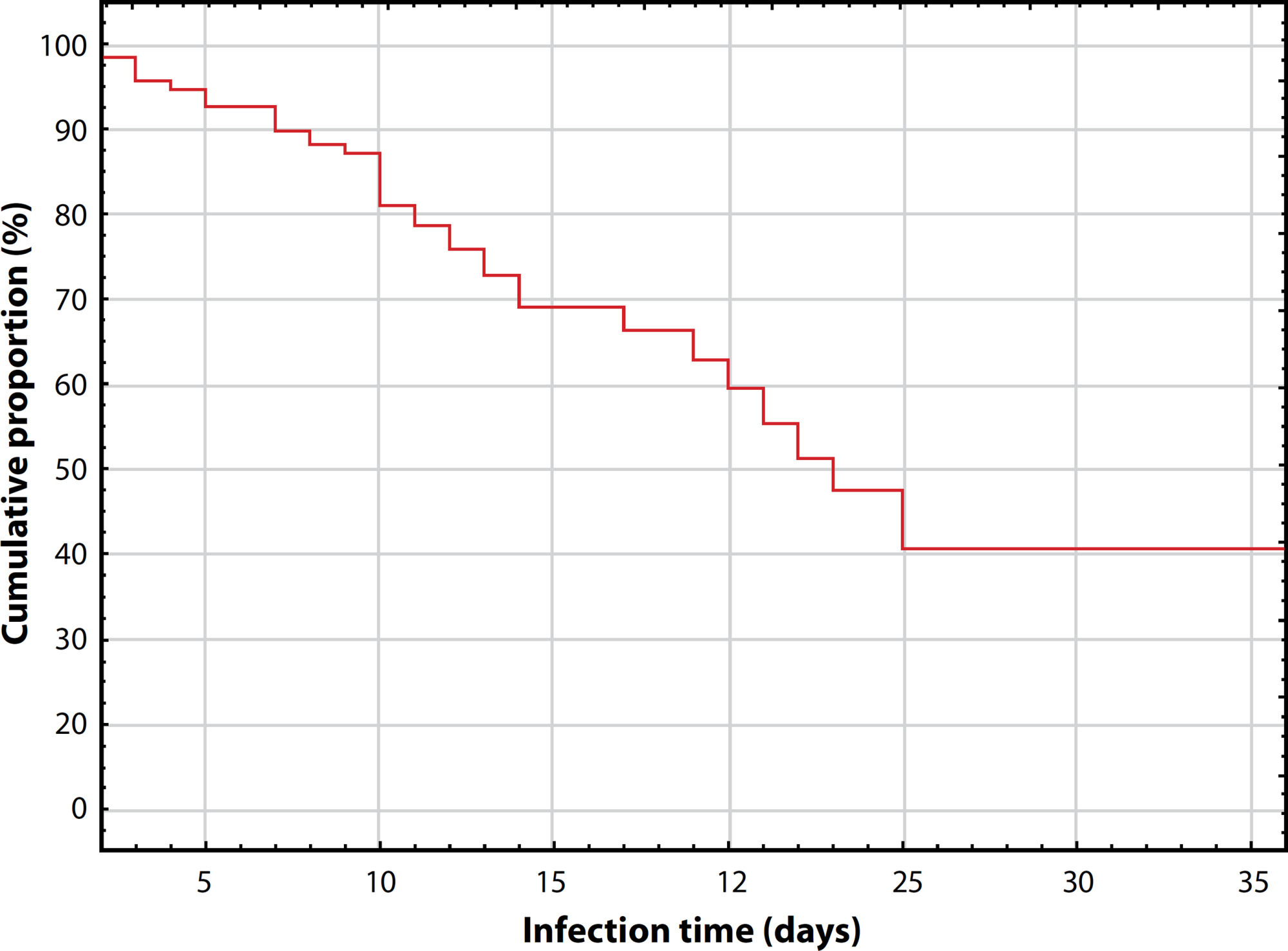
-
EXPERIENCE REPORT02-15-2021
Coronavirus infections: health care planning based on Orem’s Nursing Theory
Revista Brasileira de Enfermagem. 2021;74:e20200281
Abstract
EXPERIENCE REPORTCoronavirus infections: health care planning based on Orem’s Nursing Theory
Revista Brasileira de Enfermagem. 2021;74:e20200281
DOI 10.1590/0034-7167-2020-0281
Views0See moreABSTRACT
Objective:
to report the experience of professors and students of a graduate course on nursing care in coping with the new coronavirus (COVID-19) based on Self-Care Theory.
Method:
the active methodologies used were a literature search and seminar presentations, with an understanding of Orem’s theoretical concepts: health; man; self-care; universal, developmental and health deviation requirements; self-care activities; self-care deficits; the required therapeutic demand; nursing systems. The pandemic was considered a health deviation that requires critical thinking and nursing care planning. Methodological frameworks to classify nursing diagnoses, interventions, and outcomes were used.
Results:
for each health deviation, nursing systems were identified; self-care deficits, diagnoses; actions, interventions; and the form of assessment, outcomes.
Final considerations:
theoretical-practical reflections of the academic context support nursing care planning.
-
REFLECTION03-05-2021
Reflections on patient safety incident reporting systems
Revista Brasileira de Enfermagem. 2021;74:e20200307
Abstract
REFLECTIONReflections on patient safety incident reporting systems
Revista Brasileira de Enfermagem. 2021;74:e20200307
DOI 10.1590/0034-7167-2020-0307
Views0See moreABSTRACT
Objective:
To reflect on the main characteristics and recommendations of Incident Reporting Systems, discuss the population’s participation in reporting, and point out challenges in the Brazilian system.
Method:
Reflection study, based on Ordinance No. 529/13, which instituted the National Patient Safety Program, under Collegiate Board Resolution (CBR) No. 36/13; reflections by experts were added.
Results:
Reporting systems are a source for learning and monitoring, allow early detection of incidents, investigations and, mainly, the generation of recommendations prior to recurrences, in addition to raising information for patients and relatives. There is little participation of the population in the reporting, regardless of the type of system and characteristics such as confidentiality, anonymity, and mandatory nature.
Final Considerations:
In Brazil, although reporting is mandatory, there is an urgency to advance the involvement and participation of the population, professionals, and institutions. To simplify data entry by improving the interface and importing data from the reporting system is an objective to be achieved.
-
EXPERIENCE REPORT01-29-2021
Restructuring service at a mastology outpatient clinic during the COVID-19 pandemic
Revista Brasileira de Enfermagem. 2021;74:e20200571
Abstract
EXPERIENCE REPORTRestructuring service at a mastology outpatient clinic during the COVID-19 pandemic
Revista Brasileira de Enfermagem. 2021;74:e20200571
DOI 10.1590/0034-7167-2020-0571
Views0INTRODUCTIONCOVID-19 is a disease caused by the SARS-CoV-2 coronavirus (Severe Acute Respiratory Syndrome Coronavirus 2) and has brought a threat to public health worldwide. In need of immediate changes, adaptations tend to be the way out to avoid contamination that potentially does not distinguish race, color, gender().The global numbers of suspected and confirmed cases are […]See more
-
ORIGINAL ARTICLE09-29-2022
Neither angels nor heroes: nurse speeches during the COVID-19 pandemic from a Foucauldian perspective
Revista Brasileira de Enfermagem. 2022;75:e20201329
Abstract
ORIGINAL ARTICLENeither angels nor heroes: nurse speeches during the COVID-19 pandemic from a Foucauldian perspective
Revista Brasileira de Enfermagem. 2022;75:e20201329
DOI 10.1590/0034-7167-2020-1329
Views1See moreABSTRACT
Objective:
to analyze the processes of meaning production, based on the speeches of nursing professionals, about how they feel about the titles of “angels and heroes” given by society during the pandemic of COVID-19.
Methods:
a qualitative, documentary research. Data was collected in October and November 2020 and analyzed from the perspective of the Discourse Analysis proposed by Michel Foucault.
Results:
they were organized into two thematic categories: “Angels and heroes? The (not) heroic reality of nursing during the pandemic” and “The search for recognition of the professional work of nursing: between what is said and what is not said”.
Final considerations:
the nurses’ speeches enunciate the search for decent conditions for the execution of care, fair wages, and recognition of the professional work by society.
-
ORIGINAL ARTICLE07-23-2021
Transition to exclusive palliative care for women with breast cancer
Revista Brasileira de Enfermagem. 2021;74(5):e20201325
Abstract
ORIGINAL ARTICLETransition to exclusive palliative care for women with breast cancer
Revista Brasileira de Enfermagem. 2021;74(5):e20201325
DOI 10.1590/0034-7167-2020-1325
Views0See moreABSTRACT
Objective:
to analyze the perspectives that affect the transition to exclusive palliative care for women with breast cancer.
Methods:
qualitative, descriptive study, carried out in a public health institution in Rio de Janeiro, Brazil, between December 2018 and May 2019. 28 health professionals were interviewed. Content analysis was used in the thematic modality.
Results:
the operational difficulties were linked to the fragmented physical structure, the late and unplanned nature of the referral, the ineffective communication, and the deficit of human resources. In general, women and family members resist referral because they do not know palliative care. There is no consensus among oncologists on the most appropriate time to stop systemic therapy for disease control.
Final considerations:
the perceived difficulties configure an abrupt referral, accompanied by false hopes and, often, limited to end-of-life care.
-
REVIEW09-21-2020
Postnatal care of newborns in the family context: an integrative review
Revista Brasileira de Enfermagem. 2020;73:e20190454
Abstract
REVIEWPostnatal care of newborns in the family context: an integrative review
Revista Brasileira de Enfermagem. 2020;73:e20190454
DOI 10.1590/0034-7167-2019-0454
Views0See moreABSTRACT
Objective:
to analyze the postnatal care practices of newborns in the family context from the scientific literature.
Methods:
the searches of the integrative literature review were carried out in the Latin American and Caribbean Literature in Health Sciences (LILACS), Nursing Database (BDENF), Scientific Electronic Library Online (SciELO), and U.S. National Library of Medicine (PubMed) databases.
Results:
sixteen studies composed the final sample and, from these, two analytical categories emerged: Practices and doubts of families in postnatal care of newborns; and Best practices in postnatal care of newborns.
Final considerations:
several cultural practices of families differ from scientific recommendations, which can generate risks to the health of newborns. Therefore, it is essential to consolidate educational programs with family members, to improve the quality of care offered and to reduce preventable neonatal deaths in different socio-family contexts.

-
ORIGINAL ARTICLE09-21-2020
Family management ofchildren who experience sickle cell disease: a qualitative study
Revista Brasileira de Enfermagem. 2020;73:e20190521
Abstract
ORIGINAL ARTICLEFamily management ofchildren who experience sickle cell disease: a qualitative study
Revista Brasileira de Enfermagem. 2020;73:e20190521
DOI 10.1590/0034-7167-2019-0521
Views1See moreABSTRACT
Objective:
to know the family management experience of children with sickle cell disease in the light of the Family Management Style Framework.
Methods:
a qualitative case study carried out between September/2015 and July/2016 with 12 members of eight families registered in a blood center in Minas Gerais. The semi-structured interviews were recorded, and the data were analyzed and interpreted by the hybrid model thematic analysis.
Results:
three management styles were identified: five families in the accommodating style; two families in the struggling style; and only one family in the enduring style.It was noted that empowerment was paramount in the acquisition of skills and abilities to care for these children.
Final considerations:
family management knowledge of children with sickle cell disease provided a reflection on nurses’ role in supporting, orienting and encouraging the empowerment of these families aiming at the search for comprehensive care.
-
ORIGINAL ARTICLE12-05-2019
Falls of elderly people living in rural areas: prevalence and associated factors
Revista Brasileira de Enfermagem. 2019;72:177-183
Abstract
ORIGINAL ARTICLEFalls of elderly people living in rural areas: prevalence and associated factors
Revista Brasileira de Enfermagem. 2019;72:177-183
DOI 10.1590/0034-7167-2018-0460
Views0See moreABSTRACT
Objective:
to identify the prevalence and factors associated with falls in the elderly population living in rural areas.
Method:
this is a cross-sectional study, carried out in 2014, with 820 older adults recorded in the Family Health Strategy (Estratégia Saúde da Família). The association between the reporting of falls in 12 months and their associated factors was verified by the Chi-square and Fischer’s exact tests and by multivariate logistic regression analysis.
Results:
the majority of the sample was female (56.1%), white (90.2%) and aged 60-69 years (54.9%). The prevalence of falls was 27.9%, and being female, hypertensive and diabetic was associated to falls.
Conclusion:
it is the responsibility of health professionals to have a closer look at the elderly who have these chronic diseases, especially within the scope of the Family Health Strategy, which works longitudinally with these patients, in addition to improving nursing care aimed at this population.
-
02-25-2022
The multidimensional model of hope as a recovery-focused practice in mental health nursing
Revista Brasileira de Enfermagem. 2022;75:e20210474
Abstract
The multidimensional model of hope as a recovery-focused practice in mental health nursing
Revista Brasileira de Enfermagem. 2022;75:e20210474
DOI 10.1590/0034-7167-2021-0474
Views0See moreABSTRACT
Objective:
To analyze the theoretical dimensions of hope as a recovery-oriented practice in mental health nursing.
Method:
This is a reflective and discursive study based on theoretical and experiential aspects of hope in the recovery process of people facing mental health disorders.
Results:
Maintaining hope in adverse situations, especially while facing mental suffering, requires skills to manage the factors that promote and inhibit hope. This balance can be tricky to reach without the presence of high-skilled professionals. The study presents the concept of hope-inspiring competence and its main dimensions. The nurse’s hope-inspiring competence is recognized as a crucial advanced practice that optimizes mental health by providing motivational resources. Final Considerations: Hope-inspiring competence should be a core principle for recovery-oriented mental health professionals. Despite this recognition, the promotion of hope in mental health nursing specialized practice lacks evidence and visibility.
-
ORIGINAL ARTICLE09-16-2019
Spatial analysis on tuberculosis and the network of primary health care
Revista Brasileira de Enfermagem. 2019;72(5):1197-1202
Abstract
ORIGINAL ARTICLESpatial analysis on tuberculosis and the network of primary health care
Revista Brasileira de Enfermagem. 2019;72(5):1197-1202
DOI 10.1590/0034-7167-2017-0897
Views1See moreABSTRACT
Objective:
to analyze the spatial distribution of new cases of tuberculosis compared to the location of the Primary Healthcare Units that performed the compulsory notification.
Method:
ecological study conducted in Belém, Pará, with 5,294 new cases of tuberculosis notified to Sistema de Informação de Agravos de Notificação for the period from 2010 to 2014. The cases were georeferenced using the software applications ArcGis 10.2 and TerraView 4.2.2. The techniques of Kernel density and global Moran geostatistics were used.
Results:
the incidence of tuberculosis cases did not vary significantly between the years studied, however there was a variation in incidence between neighborhoods. Health units that exhibited higher number of notifications can suffer great influence of migration from nearby neighborhoods.
Conclusion:
the spatial dynamics of tuberculosis associated with health services allows to know the areas with increased risk of tuberculosis and the density of notifications of health units.

-
ORIGINAL ARTICLE10-21-2019
Education in Diabetes Mellitus for blood glucose self-monitoring: a quasi-experimental study
Revista Brasileira de Enfermagem. 2019;72(6):1601-1608
Abstract
ORIGINAL ARTICLEEducation in Diabetes Mellitus for blood glucose self-monitoring: a quasi-experimental study
Revista Brasileira de Enfermagem. 2019;72(6):1601-1608
DOI 10.1590/0034-7167-2018-0731
Views0See moreABSTRACT
Objective:
to evaluate the contributions of an educational program for capillary blood glucose self-monitoring.
Method:
a quasi-experimental study performed in an outpatient unit of a tertiary health care service in a sample of 25 people with Type 2 Diabetes Mellitus, from July 2016 to December 2017, developed through interactive tools for care with capillary blood glucose self-monitoring.
Results:
among the items of capillary blood glucose self-monitoring that showed improvement after participation in the educational program, the most noteworthy are the “postprandial blood glucose values” (p=0.0039), “Interpretation of capillary blood glucose results with meals and medications” (p=0.0156), “recognition of the ‘weakness’ symptom for hyperglycemia” (p=0.0386) and “administration of medications correctly” for hyperglycemia prevention (p=0.0063).
Conclusion:
the study made it possible to recognize the main characteristics of blood glucose self-monitoring that may contribute to the care for the person with diabetes.
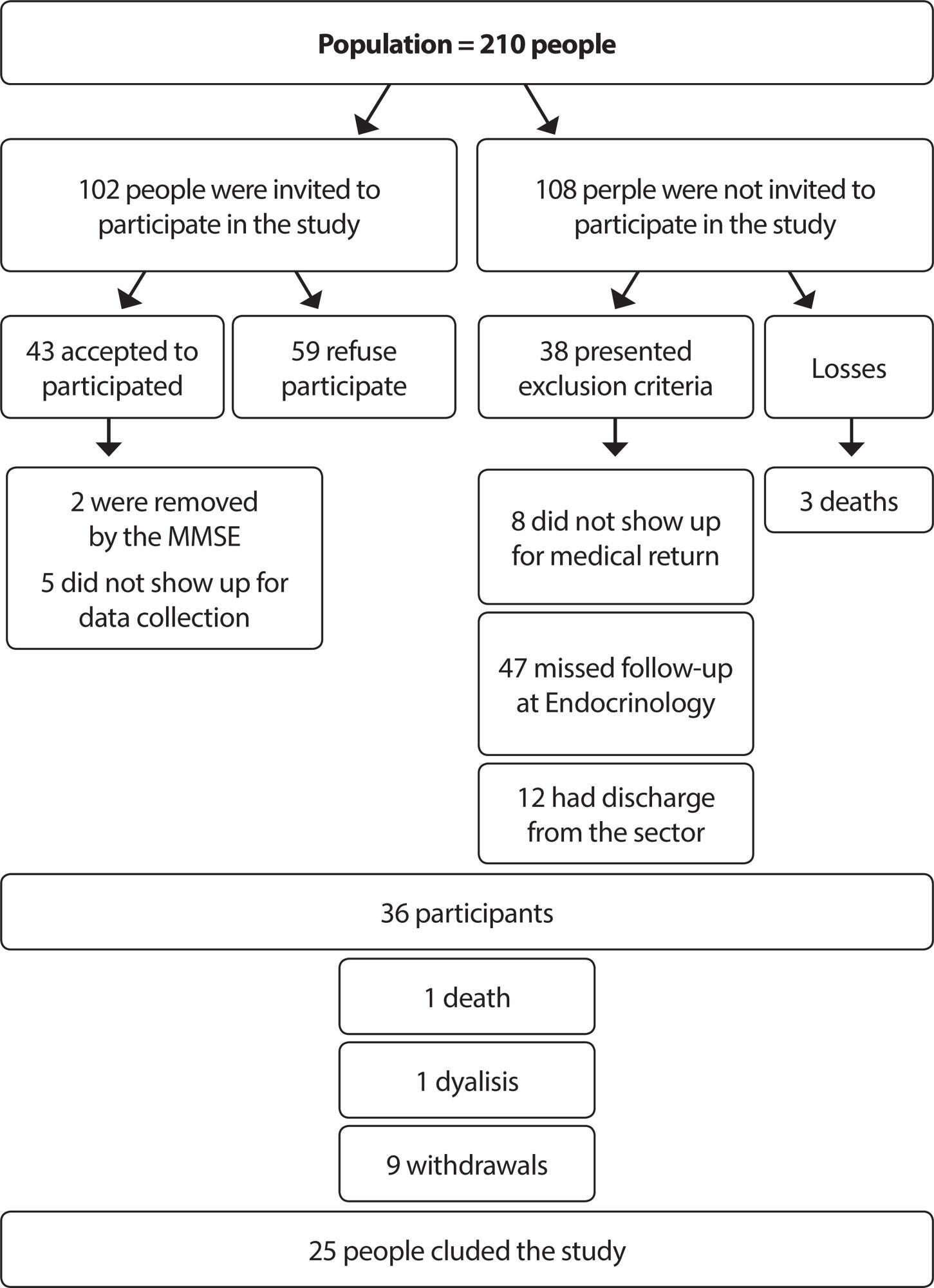
Search
Search in:
Nuvem de Tags
Adolescente (85) Atenção Primária à Saúde (239) COVID-19 (91) Criança (91) Cuidados de Enfermagem (269) Educação em Enfermagem (151) Educação em Saúde (139) Enfermagem (930) Enfermagem Pediátrica (86) Estudantes de Enfermagem (77) Estudos de Validação (131) Família (87) Idoso (208) Promoção da Saúde (99) Qualidade de Vida (104) Saúde do Trabalhador (86) Saúde Mental (145) Saúde Pública (82) Segurança do Paciente (150) Tecnologia Educacional (100)



